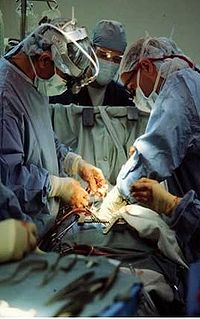
Photo from wikipedia
AIMS Post-extubation dysphagia (PED), an often-overlooked problem, is a common and serious complication associated with mortality and major morbidity after cardiovascular surgery. Dysphagia is considered an age-related disease, and evaluating… Click to show full abstract
AIMS Post-extubation dysphagia (PED), an often-overlooked problem, is a common and serious complication associated with mortality and major morbidity after cardiovascular surgery. Dysphagia is considered an age-related disease, and evaluating its long-term effects is a pressing issue with rapidly progressing ageing worldwide. Therefore, we examined the effect of PED on functional status and long-term cardiovascular events in patients undergoing cardiovascular surgery. METHODS AND RESULTS This single-centre, retrospective cohort study included 712 patients who underwent elective cardiovascular surgery and met the inclusion criteria. Patients were divided into the PED and non-PED groups based on their postoperative swallowing status. Swallowing status was assessed using the Food Intake Level Scale. Functional status was evaluated as hospital-associated disability (HAD), defined as a decrease in activities of daily living after hospital discharge compared to preoperative values. Patients were subsequently followed up to detect major adverse cardiac and cerebrovascular events (MACCE). PED was present in 23% of the 712 patients and was independently associated with HAD (adjusted odds ratio, 2.70). Over a 3.5-year median follow-up period, MACCE occurred in 14.1% of patients. Multivariate Cox proportional hazard analysis revealed HAD to be independently associated with an increased risk of MACCE (adjusted hazard ratio, 1.85), although PED was not significantly associated with MACCE. CONCLUSIONS PED was an independent HAD predictor, with the odds of HAD occurrence being increased by 2.7-fold due to PED. HAD accompanied by PED is a powerful predictor of poor prognosis. Perioperative evaluation and management of swallowing status, and appropriate therapeutic interventions, are warranted.
Journal Title: European journal of cardiovascular nursing
Year Published: 2022
Link to full text (if available)
Share on Social Media: Sign Up to like & get
recommendations!